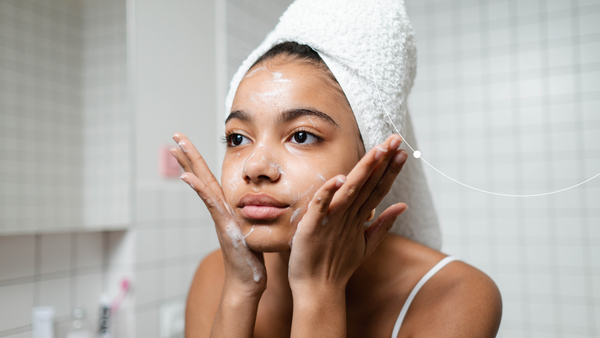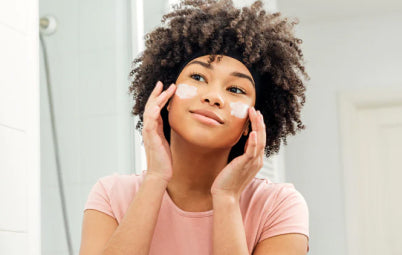There’s a reason you can’t buy tretinoin over the counter in the UK; prescription skincare ingredients are intensive and medical grade, making them incredibly effective on skin but somewhat sensitive when used alongside other products. Put simply, tretinoin is a bit touchy, and doesn’t always react well with other skincare ingredients!
Face Dr is an authorised stockist of Obagi Medical, ZO Skin Health, Clinical Skin and Glytone, and we offer targeted regimes for a number of skin concerns, including pigmentation, acne, ageing skin and more. We have already covered all things tretinoin in our article ‘What is Tretinoin and how does it work?’, but here we’re diving deeper into the products you can use alongside this acne-busting skin saviour, what you should not be using, and the contraindications to tretinoin. Let’s take a look at this super ingredient and how not to interfere with its effectiveness.
Want a quick answer to whether or not a product can be used alongside your tretinoin cream? Jump right ahead to booking your free consultation with a Face Dr Skin Expert.
Here’s what we’ll cover in this article:
- What is tretinoin and how does it work?
- How do I know if there is tretinoin in my skincare products?
- Why can’t I mix certain skincare and makeup products with tretinoin?
- What skincare ingredients and products should I avoid?
- What makeup ingredients and products should I avoid?
- Does this mean I can’t use my favourite products?
- What if I’m unsure about whether or not I can use a product?
- Are there any side effects I need to know about?
- What tretinoin products does Face Dr recommend?
- Summary: How do I know what products to avoid when using tretinoin?
What is Tretinoin and how does it work?

Tretinoin is the generic name for synthetic, first-generation all-trans-retinoic acid; the active ingredient in vitamin A that works to keep pores clear. It began as an effective acne treatment in the 1960s, and continues to be used for this purpose today. Tretinoin can also be used to smooth fine lines and wrinkles.
It works by actively irritating the skin for the first few weeks, speeding up the life cycle of skin cells and replacing them with healthier cells faster. This can lead to some side effects like skin peeling, flaking or redness - more on this below! Tretinoin is a retinoid, and all-round great ingredient for the skin as research shows it can exfoliate, reduce inflammation, stop follicles clogging, treat sun-damaged skin, and reduce the appearance of dark spots.
How do I know if there is tretinoin in my skincare products?

If you have purchased a skincare product online or in-store without the need for a prescription, then we can say with most confidence that there won’t be any tretinoin in the formulation. This is because tretinoin is a prescription-only ingredient, meaning you cannot purchase it without first speaking to a professional. This might be a doctor, a certified dermatologist or one of our Skin Experts here at Face Dr, for example!
Why can't I mix certain skincare and makeup products with tretinoin?

Tretinoin can be a tricky one! When you begin using it for the first time, your Skin Expert will talk you through what to expect, but it will probably cause some irritation and flaking in the first few weeks as your skin adjusts to the ingredient. Your skin may seem more sensitive during this time, so there are some skincare products that may further irritate skin, and some makeup products that won’t give the desired look while your skin is still flaking or peeling.
You should also be aware that using tretinoin means your skin is much more susceptible to sunburn, so one product you should definitely be adding to your daily routine during this time is a sunscreen or a product that contains a strong SPF to protect your skin from damage and further irritation.
What skincare ingredients and products should I avoid using with Tretinoin?
Let’s get into detail about what you don’t want to use, because applying the wrong product alongside your tretinoin can cause a reaction. You may want to avoid using the following:
Any peeling agents

Like benzoyl peroxide, resorcinol, salicylic acid or sulfur. Applying these to sensitive skin will only exacerbate the irritation and redness.
Products that make skin sensitive to the sun

Check if your skincare products contain a warning about making skin more susceptible to sunburn. Your tretinoin product is already doing this, so you don’t want to make it worse.
Irritating hair removal products

If you regularly use hair removal products on areas of your face, such as your upper lip, eyebrows or cheek/jawline area, you should try to hold off on these until your skin has adjusted to the tretinoin. If you must remove hair, opt for tweezers or speak to your Skin Expert for alternat ive products.
Products with high alcohol content

Shaving creams, for example. A quick check of the ingredients list should tell you if your product contains alcohol, but in many cases the ingredients won’t have obvious names so do a little research on these. Look out for names like cetyl, stearyl, and cetearyl alcohol which are common in skincare products.
Abrasive products

Like some soaps, exfoliators and cleansers. You'll want to steer clear of anything that has a heavy fragrance or an abrasive texture. If you’re unsure about what products might be abrasive or potentially damaging, always feel free to reach out to your Skin Expert who can advise further.
What makeup ingredients and products should I avoid whilst using Tretinoin?
Mixing tretinoin with certain makeup products can cause problems too. Although reactions can still occur, with makeup it’s much more likely to be a texture issue, since tretinoin causes the skin to flake for the first couple of weeks of use.
It is certainly better to avoid makeup products if at all possible while in the first few weeks of using tretinoin, but if you must wear it our advice would be:
Keep makeup to a minimum

Try to avoid foundation as this can start to separate and look patchy. Although it may feel uncomfortable to skip this step, chances are your skin will look better without it anyway.
Try to only wear makeup out
When you’re back in the house, remove any makeup so your skin can breathe, and do not sleep in makeup.
Avoid powders
If you must wear foundation, opt for something light like a tinted moisturiser, a BB cream or CC cream.
Use oil-free makeup
Stick to makeup that’s non-comedogenic (not likely to clog pores) and non-acnegenic (not likely to cause acne), and stick to hypoallergenic and fragrance-free makeup to avoid further irritation. One study suggests mineral makeup is well tolerated by those with very sensitive skin, so this may be worth trying if you are looking for more soothing makeup products that won’t further irritate skin.
Apply makeup with your fingers

Makeup brushes can have harsh bristles that may aggravate irritated skin, so wash your hands thoroughly and use your finger to apply makeup for the time being.
Never apply makeup to raw, open skin
If you experience broken skin, don’t try to cover this up with makeup. Stop using all products for now and speak to your Skin Expert.
Cover with concealer, not foundation
If you have blemishes, it’s best to spot-cover with concealer rather than applying a whole layer of foundation.
Draw attention to the eyes

If you can, skip the foundation until your skin stops peeling, and focus on making your eye makeup flawless to draw attention to this area - no one will notice your complexion!
Your Skin Expert can advise on any ingredients in your makeup that may be best avoided during this time, but if you have any questions about your accompanying beauty regime you should always feel free to reach out and ask so they can help make you feel comfortable and give your tretinoin product the best chance of working.
Does this mean I can’t use my favourite products?
Not necessarily. Typically our Skin Experts suggest applying your tretinoin product in the evening, so you may be able to apply other topical products in the day without them interfering, as long as you gently remove makeup and avoid other products right before your tretinoin application, as directed by your Skin Expert.
What if I’m unsure about whether or not I can use a product?

If you are worried that one of your usual products (or a new one you’ve had your eye on) will interfere with the effectiveness of your tretinoin product, don’t hesitate to speak to your Skin Expert - they are here to help.
Skincare can be a minefield with so many ingredients, formulations and options to consider. Experimenting without any advice could potentially impact the effectiveness of your tretinoin, so use the expertise of your professional Skin Expert to determine which products to stick with and which to ditch for now.
Are there any side effects I need to know about?
Tretinoin can cause side effects, particularly irritable and peeling skin in the first few weeks of use. As a prescribed treatment, it is important to communicate to your Skin Expert anything that you believe could cause additional side effects or issues (such as allergies) so they can determine the best treatment for you. If you notice any of the following symptoms, stop using the product and book an appointment with your Skin Expert as soon as possible to discuss:
- Irritation that gets worse over time
- Blistering of the skin, or crusting rather than flaking
- Any swelling or excessive redness
- Any concerning changes in skin pigmentation
What tretinoin products does Face Dr recommend?

We recommend a few carefully selected, science-backed brands based on the expertise of our Skin Experts. Our brand partners include Obagi Medical, ZO Skin Health, Glytone & Clinical Skin.
Tretinoin is a prescription-only ingredient, so to order products that contain this you will need to speak to a professional (our Skin Experts can help) for a consultation and the relevant prescription. You can book your consultation by tapping below.
Summary: How do I know what products to avoid when using tretinoin?
The key things to remember are a) avoid wearing makeup for the first few weeks if you can, b) wear an SPF sunscreen, and c) don’t use any exfoliating AHA or BHA acids as these are most likely to dry and irritate skin. Simple.
Of course there are others to avoid, so your best option is always to speak to one of our Skin Experts (or your chosen professional elsewhere) who can tell you exactly what products will and won’t work alongside tretinoin. We always strive to offer you unbiased, helpful advice, so instead of encouraging you to purchase additional products that may or may not irritate your skin while using tretinoin, we recommend speaking to one of our Skin Experts who can recommend the products that are most likely to work for you.
We are not loyal to one product or brand, so while we may recommend Obagi Medical, we may instead recommend another product that we believe will work better for you. Our advice is always free, and we will never pressure you to purchase from us.
If you receive a prescription for a tretinoin product after a consultation with us, you will be able to log in to your secure Face Dr account which allows you to purchase the product, and once you do, we’ll post it to you next working day, anywhere in the UK.
Your Skin Expert will be happy to help you, simply click the button below to book.
Want to read more about acne treatments? Click the articles below:
- What is Tretinoin and how does it work?
- Top 5 skincare tips for people suffering with acne vulgaris
- How to choose the right acne skincare routine for you











